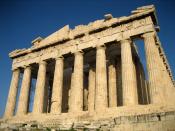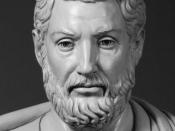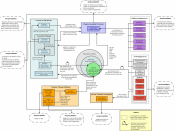What is in a word? We may live in a very different and much more complex world, but without the ancient Greeks, we would not even have the words to talk about many of the things we care most about. Take politics for example: apart from the word itself (from polis, meaning city-state or community), many of the other basic political terms in our everyday vocabulary are borrowed from the ancient Greeks: monarchy, aristocracy, tyranny, oligarchy and - of course - democracy.
The ancient Greek word demokratia was ambiguous. It meant literally 'people-power'. However, who were the people to whom the power belonged? Was it all the people - all duly qualified citizens? Or only some of the people - the 'masses'? The Greek word demos could mean either. There's a theory that the word demokratia was coined by democracy's enemies, members of the rich and aristocratic elite who did not like being outvoted by the common herd, their social and economic inferiors.
If this theory is right, democracy must originally have meant something like 'mob rule' or 'dictatorship of the proletariat'.
'Greece was a collection of some 1500 separate communities scattered round the Mediterranean and Black Sea shores 'like frogs around a pond.'
By the time of Aristotle (fourth century BCE) there were hundreds of Greek democracies. Greece in those times was not a single political entity but rather a collection of some 1500 separate poleis or 'cities' scattered round the Mediterranean and Black Sea shores 'like frogs around a pond', as Plato once charmingly put it. Those cities that were not democracies were either oligarchies - where power was in the hands of the few richest citizens - or monarchies, called 'tyrannies' in cases where the sole ruler had usurped power by force rather than inheritance.


